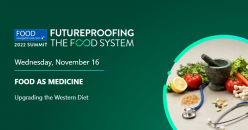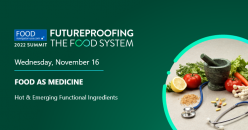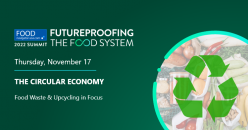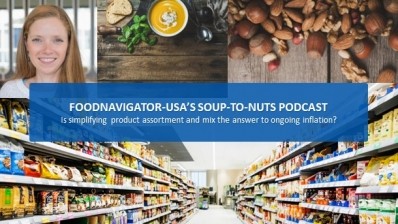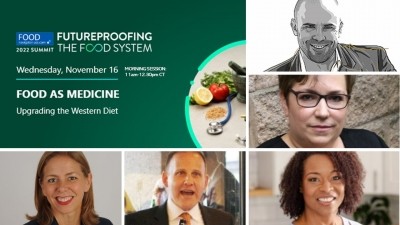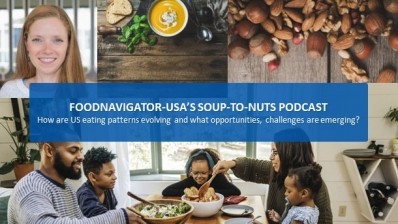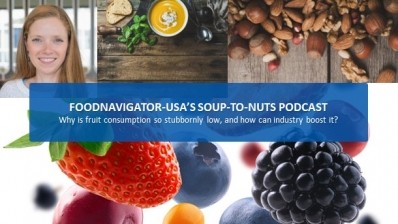Soup-To-Nuts Podcast: From food as medicine to sustainable packaging – trendspotting at Expo East
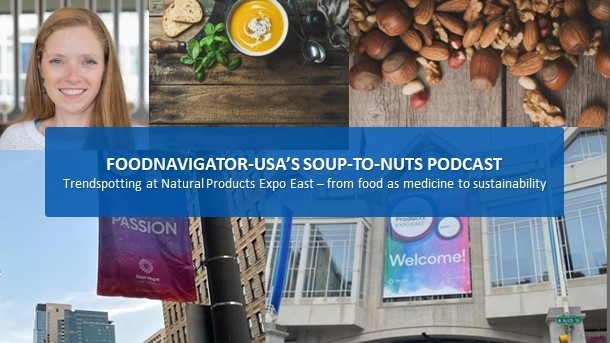
Long considered a core tenet of the natural products industry, new products on display highlighted how brands’ – and consumers’ – are becoming more sophisticated in their approach to ‘better-for-you’ products and sustainability. At the same time, a back-to-basics focus by several exhibitors highlighted consumer desire for simpler ingredients, like heritage grains, as well as recipes and production methods grounded in tradition for a more authentic experience.
In this episode of FoodNavigator-USA’s Soup-To-Nuts podcast, we explore these trends as well as efforts by exhibitors to improve the planet’s health through more sustainable packaging, waste reduction and partnering with third-part certifiers to lower carbon emissions and better communicate the value of clean ingredients.
[Editor’s Note: Never miss an episode of FoodNavigator-USA’s Soup-To-Nuts podcast – subscribe today.]
Food as medicine addresses physical and mental risks
Early in the pandemic when many people were desperate to fend off COVID-19 they turned in droves to foods and beverages that promised to bolster their immunity – opening the door for a broader conversation about and adoption of food as medicine.
US sales of functional foods grew more than 8% in the first year of the pandemic and 8.3% in the second to $83.7b in 2021 with the beverages, snacks and desserts leading the way, according to data from SPINS and New Hope presented at Expo East.
And interest in beverages promising heath benefits – both physical and mental – remains high based on the number of attendees crowded around the booth of the recently launched, better-for-you soda brand Perfy, which was recently launched by Quest Nutrition Veteran Vasa Martinez.
He explains that he created Perfy as a lower-sugar option to the soda he loved to address his own battle with pre-diabetes, but also as a way to support mental health, with which many people – including Martinez – struggled during the pandemic.
“One in 10 people right now [have diabetes] in American, and in … the next three years by 2025, one in five will be,” Maratinez said, noting most people don’t know they have pre-diabetes.
To help lower the risk of soda-lovers like himself from developing diabetes, Perfy uses real fruit juice, not from concentrate, and a blend of sweeteners that don’t have a metabolic impact, but which recreate the classic flavor profiles of soda.
But Perfy doesn’t just address physical health challenges, it also takes on mental health with the addition of ayurvedic ingredients touted for their mood boosting benefits, and a supportive marketing campaign that Martinez says incorporates some of which helped him as he struggled with loss during the pandemic.
Martinez says he believes that Perfy fills an unmet need in the market because while there are other better-for-you sodas, many of them focus on gut-health – not mental health.
And according to data from SPINS and New Hope, the potential for products playing in this space is significant given 41% of consumers say they regularly experience stress and 37% say the same about anxiety and depression. Indeed, sales of mood and mental health supplements grew 11.5% to $1.3 billion in 2021from the previous year and is on track to more than double between 2017 and 2025.
Rising consumer interest in food as medicine is also driving up sales of other ingredients promoting a range of benefits, including collagen – which saw a 9% increase in growth to $19 million across categories. This growth spiked to 15% year-over-year within the snacking space – an intersection at which the better-for-you pork rinds from Southern Recipe Small Batch sits.
German Reyes, part of the sales team at Southern Recipe Small Batch, explains that by adding a callout to the front of pack about the 7 grams of naturally occurring collagen in their pork rinds the company was able to expand the appeal of the snacks to new consumer groups.
In particular, the callout has helped a snack typically consumed by men appeal to more women, likely because of its health benefits for hair, skim and nails.
“My boss puts it as we always had Bubba, but … we need that Becky from the household, and that’s eactlay who we targeted. We’ve run a lot of data, we’ve done a lot of research and we found that brought the female consumer to the category, which is something we’re very, very proud of,” he said.
Other ingredients that SPINS reports consumers are embracing as food as medicine including functional mushrooms, sales of which are up 26% to $52m, Ashwaganda, which is up 88% to $16m, elderberry, which saw sales sore triple digits to 153% to $38 million and maca, which is up 23% to $13 million.
If you are interested in learning more about Americans embrace of food as medicine and the market potential it offers, I encourage you to tune into FoodNavigator-USA’s upcoming digital summit, which will take a closer look at the potential of medicinal mushrooms, mood-boosting ingredients and the potential of public-private partnerships to enhance access to healthy food. You learn more and register at www.foodnavigatorusasummit.com.
Better-for-you 2.0 – from carefully considering oils to reducing sugar
Growing along side consumers’ interest in food as medicine is a desire to eat healthier in general – which is driving innovations with better-for-you recipes that either forgo or use healthier alternatives to some of the less desirable ingredients, such as oils, which Tiffany Perkins, the founder and CEO of Plant Perks says she avoids in her plant-based cheeses, condiments and spreads, but selects carefully for inclusion in her plant-based butter.
She explains that used to add MCT oil to her spreads because it was “really on trend” with rise of paleo and keto as diets, but that consumers often asked her for an oil free options and that most had never heard of MCT oil – by listening to shoppers she was able to reduce the fat content without impacting texture or mouthfeel given the other ingredients.
On the other end of the spectrum is a plant-based butter that Perkins says she is developing, and while this will obviously require oil, she says she is carefully selecting the types to address health concerns. In particular, she is avoiding oils she says can cause inflammation and opting for almond oil, which she says “is actually really good for your body.”
As Perkins noted, her focus on fat mirrors that of the consumer, which according to data from SPINS and New Hope is a consideration point for about a third of consumers reading labels. Within the hierarchy of fat consideration, more consumers look for trans fats at 31% than saturated fat, which comes in at 30%. About a quarter of consumers look at mono- and polyunsaturated fat when assessing nutrition labels.
Another company that carefully considers the oils in their products is confection brand Hail Merry, which built health fats into its mission, according to the company’s director of sales Michael Bepko.
“It’s about celebrating the health benefits of the dietary oils that are found in plants,” such as coconut, almonds and cashews, he said.
Bepko says the brand is just as thoughtful about how it approaches sugar and sweeteners, which SPINS data shows is a top priority for consumers, with 42% of those who read nutrition labels look at sugar and 36% looking at artificial sweeteners. With this in mind, Hail Merry is bolding declaring that its almond butter cup has 50% less sugar than other competing natural brands.
Sustainable packaging lessens impact on the environment but boosts it on shelf
Just as important as what is inside products to natural and organic consumers is what is outside – with many prioritizing products in more sustainable and minimal packaging – a trend that the seaweed-focused brand Ocean’s Halo is embracing with the roll out of its its Trayless Seaweed Snacks.
Bob Childs, VP of sales at New Frontier Foods Inc, explains the secret to the slimmed down pack is in a tweak to how the seaweed sheets are processed – underscoring how product formulation and packaging innovation often go hand in hand.
While twisting and crumpling a package of the company’s new trayless seaweed snacks, Childs explains that the product won’t crumble, tear or break and then when sold side-by-side on the shelf next to packages with a tray will outsell the other option and allow for more product to be stocked and readily available – making it a smart business decision.
At the show, there was also a strong emphasis on promoting sustainability while simultaneously pushing back against greenwashing by adopting third-party certifications.
Another major trend that stood out at Expo East was a deliberate intention to honor and lift up the heritage of food – be it sharing the stories behind heirloom grains and making them more convenient or authentically replicating traditional dishes and beverages from across cultures.
These are just a handful of the innovative products and emerging themes that are sure to gain traction in the coming months and years. If you are interested in learning more about what happened at Expo East be sure to checkout FoodNavigator-USA.com for stories, videos and other podcasts from the conference in the coming weeks.

